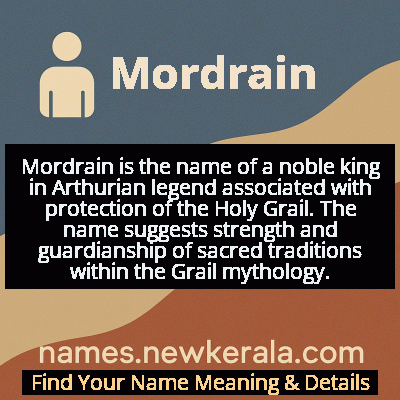Mordrain Name Meaning & Details
Origin, Popularity, Numerology Analysis & Name Meaning of Mordrain
Discover the origin, meaning, and cultural significance of the name MORDRAIN. Delve into its historical roots and explore the lasting impact it has had on communities and traditions.
Name
Mordrain
Gender
Male
Origin
Arthurian
Lucky Number
2
Meaning of the Name - Mordrain
Mordrain is the name of a noble king in Arthurian legend associated with protection of the Holy Grail. The name suggests strength and guardianship of sacred traditions within the Grail mythology.
Mordrain - Complete Numerology Analysis
Your Numerology Number
Based on Pythagorean Numerology System
Ruling Planet
Moon
Positive Nature
Diplomatic, friendly, artistic, empathetic.
Negative Traits
Over-sensitive, moody, indecisive, prone to self-pity.
Lucky Colours
Green, cream, white.
Lucky Days
Monday.
Lucky Stones
Pearl, moonstone.
Harmony Numbers
1, 3, 4.
Best Suited Professions
Diplomats, mediators, caregivers, artists.
What People Like About You
Cooperative spirit, friendliness, artistic talent.
Famous People Named Mordrain
King Mordrain
Arthurian Monarch
Converted to Christianity and became guardian of the Holy Grail, surviving for centuries through divine intervention
Mordrain the Pious
Religious Figure
Established the Grail Castle and maintained the sacred traditions surrounding the Holy Grail
Mordrain of Listeneise
Noble King
Ruled wisely and protected his kingdom while maintaining the Grail's sanctity
Name Variations & International Equivalents
Click on blue names to explore their detailed meanings. Gray names with will be available soon.
Cultural & Historical Significance
The character serves as a bridge between the historical Christian tradition and the Arthurian world, embodying themes of redemption, divine grace, and the sacred responsibilities of leadership. Mordrain's establishment of the Grail Castle and his role in preserving the sacred vessel make him a foundational figure in the Arthurian spiritual hierarchy. His story explores the tension between earthly power and spiritual devotion, presenting a model of kingship that prioritizes service to divine purposes over temporal authority. The enduring legacy of Mordrain in Arthurian literature demonstrates how medieval writers used such characters to explore complex theological concepts within the framework of chivalric romance.
Extended Personality Analysis
Mordrain is characterized by profound spiritual devotion, exceptional patience, and a deep sense of sacred responsibility. His conversion experience transforms him from a conventional monarch into a spiritually enlightened guardian, demonstrating remarkable openness to divine guidance and personal transformation. The legendary accounts portray him as possessing unwavering faith, willingly accepting centuries of isolation and vigil in service to the Grail, which reveals extraordinary commitment and trust in divine providence. His personality embodies the ideal of Christian kingship—combining royal authority with humble service to higher purposes.
Beyond his spiritual dimensions, Mordrain displays considerable wisdom and judgment in his governance, suggesting a balanced ruler who understands both temporal and eternal concerns. His ability to maintain the Grail traditions across generations shows exceptional organizational skills and dedication to preserving sacred knowledge. The character's interactions with other Arthurian figures reveal a mentoring quality, as he guides and tests subsequent Grail seekers. Mordrain's enduring patience—waiting centuries for Galahad—demonstrates a personality capable of extraordinary long-term vision and commitment to purposes that transcend individual lifespan or immediate gratification.
Modern Usage & Popularity
In contemporary contexts, Mordrain remains an extremely rare name used almost exclusively within specialized circles of Arthurian enthusiasts, historical fiction writers, and fantasy literature creators. The name has never achieved mainstream popularity and does not appear in modern baby name databases or government registries. Its primary modern application is in fictional works—particularly fantasy novels, role-playing games, and Arthurian adaptations—where it serves to evoke medieval authenticity and Grail mythology. The name's complexity, unusual sound, and strong specific literary associations make it challenging for everyday use, though it occasionally appears in creative works exploring Arthurian themes or medieval fantasy settings. Current usage trends show the name maintaining its status as a scholarly or creative choice rather than a practical given name, with its recognition largely confined to Arthurian specialists and fantasy literature aficionados.
Symbolic & Spiritual Meanings
Mordrain symbolizes the sacred intersection of spiritual devotion and royal responsibility, representing the archetype of the king as spiritual guardian and servant of higher purposes. His miraculous longevity embodies the concept of eternal vigilance and the idea that some sacred missions transcend ordinary human timescales. The character serves as a living bridge between the human and divine realms, symbolizing how earthly authority can be transformed into spiritual stewardship. Mordrain's transformation from secular ruler to Grail guardian represents the potential for profound personal redemption and the capacity of divine grace to repurpose human lives for sacred ends. His patient waiting for the perfect Grail knight symbolizes the necessary preparation and purification required for ultimate spiritual achievements, making him an emblem of divine timing and the belief that true fulfillment comes through alignment with higher purposes rather than personal ambition.

